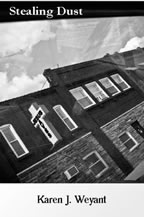
|
Disclosure: I taught a weeklong workshop at the Chautauqua Institute’s Writer’s Center a few years ago, and one of the people among the dozen passionate adults committed to reading and writing poetry at least as earnest amateurs was Karen Weyant, someone committed as well as talented, someone very much not an amateur (a distinction I realize implies there are professional poets, which strikes me as incorrect, but I am hoping you will bear with me, dear reader). In short, because of her work, I remembered her long afterward, and not only because of her last name’s near match to my wife’s. I recalled images: a sister inheriting jeans and a worldview from her older sister, girls the age my daughter is now letting watermelon juice run down their arms as they begin the vaguest fantasies of things called husbands, mosquito bites turning to bruises. I recalled from her poems that she had an abiding interest in working class people, had come herself from Pennsylvania’s blasted and devastated region—that would be, incidentally, its sprawling middle—where coal and steel conspired to fail at about the same time (perhaps they would call that a “market correction” now), leaving working people struggling just a wee bit more than usual. And now, three years later, I am reminded of why those images stayed with me. Weyant’s debut chapbook, Stealing Dust, brings alive a time and place with images both unforgettable and familiar. In “Sneaking Into the Drive-In,” a narrator recalls that because she was young, she “always got stuck/next to the tailgate, my body crunched/into the letter C.” In “Local Lore,” it’s easy to hear the “beer cans in the back of an old Ford/the scrape of a loose tailpipe dragging.” And to rural Pennsylvanians, we all know an “Old Mr. Cummings . . . yelling that Satan was in the fine-n-dime again” and, as well, the girl of the poem’s title, who “Carved Jesus Into Her Forearm.” The images are crafted in poems that play within their forms to highlight the larger issues and challenges with which their subjects struggle, mostly not realizing it. For instance, in “The Playground,” the scenes recalled could be any playground, but the enjambments she uses isolate the general from the particular again and again, highlighting that as the people in the poem grow older, the behavior will grow harsher, hardening their relationships to match the circumstances they face. Young, and aware that previous to the time of the poem Timmy Higgins has grabbed the shorts of another girl and yanked them down, the playground girls wear overalls, trying to be Safe The boys are at the “top” here, and the girls are buckled “against.” For now, it’s against their own bodies, but the implication is that later it will be the boys. The boys spit—apple seeds now. We know the sidewalk besmirching teens they will become, and hope it’ll end there. The enjambments at “bodies” and “sat” highlight similar tensions. By the end of the poem, when the girls learn about “silent suffering” and about how scars are seen “frowning through/ pale and thin flesh,” their trajectory is calcified, just as is the cycle of violence the boys have learned in the very place they are supposed to play. Weyant’s control of tension, image, and form comes through in each of the twenty rich and haunting poems in Stealing Dust. While most of the poems have a free verse form, her rhythm is controlled conversational, the cadence of someone telling it straight. The formal rigor here is underneath, working subtly. In “Joyride,” for instance, a narrator recalls a joyride gone innocently awry, crash in a cornfield, but the poem takes a one-step-forward, two-steps-back progression of leaving and returning, looking ahead and looking back, implying that beneath the story is the conflict present in so many people from central Pennsylvania eager to leave the “strings of stores sealed tight with plywood,” but forced to acknowledge even the meager light from the street lights “even in the darkest of dusks.” When the narrator says it’s a one-stoplight town, she admits in the next line there were three. When leaving “should have been easy,” there was always “a check engine light.” And so on, until the poem’s mobius strip conclusion that throws the reader back to the beginning. An anecdote that reveals both of central Pennsylvania’s seasons: summerish spring! And horrific, crushing winter. Weyant’s debut is a clear look at a time and a place in the country that has much to say to our current situation, and for that reason alone it is worth the time of readers. It is also very good poetry, by a person who is committed as a reviewer and scholar of working people’s issues, as well as to poetry. And it will deliver again and again delightful and scary lines like this, from the title poem, talking about how the workers leaving a factory are not searched to see if they are stealing: “They don’t care about what we/ take home with us: dirt that crawls/ up our jeans, seeps through our socks,/ leaving tiny dots like deer ticks.” --Gabriel Welsch
|
